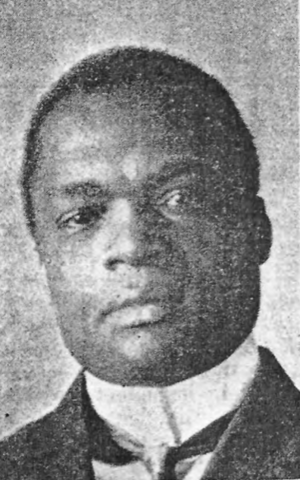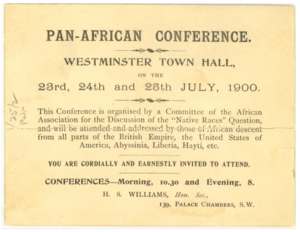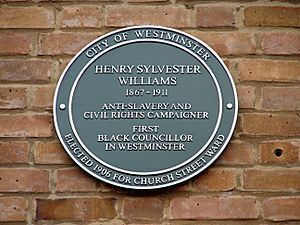Henry Sylvester Williams facts for kids
Henry Sylvester-Williams (born in 1869, died in 1911) was an important person from Trinidad. He was a lawyer, an activist, and a writer. He helped start the Pan-African movement. This movement aimed to unite and support people of African descent around the world.
When he was young, Williams traveled to the United States and Canada. He went there to continue his education. Later, he moved to England. In 1897, he started the African Association. This group wanted to help people of African descent. They worked to protect their rights in British colonies and other places.
In 1900, Williams organized the First Pan-African Conference. It was held in London at Westminster Town Hall. Later, in 1903, he became a lawyer in South Africa. He was the first black man to become a lawyer in the Cape Colony.
Contents
Early Life and Education
People are not sure exactly when and where Henry Sylvester-Williams was born. Some say he was born in 1869 in Arouca, Trinidad. Others believe he was born in Barbados in 1867. He might have moved to Trinidad with his parents when he was very young.
Henry was the oldest son of Elizabeth and Henry Bishop Williams. His father was a wheelwright from Barbados. Henry grew up in Arouca, a village where most people were of African descent. He went to the Arouca School.
Becoming a Teacher
At 17, Williams started working as a teacher. He had a Class III Certification. In 1887, he was sent to teach at a government school in San Fernando. Records show he was one of only three certified teachers that year.
A year later, he was the only certified teacher at a school in Canaan. This town was just south of San Fernando. The next year, he moved to San Juan. He stayed there until he left Trinidad in 1891. Henry was also good at music. He could teach singing and played the piano often.
Standing Up for Teachers
In January 1890, Williams helped create the Trinidad Elementary Teachers Union. The main speech was given by Chief Justice Sir John Gorrie. Gorrie supported changes in government. He often disagreed with the white ruling class. People loved him because he often ruled against the powerful. They called him "Papa Gorrie."
Williams told the teachers to act like professionals. He reminded them that Trinidad was a free country, even as a British colony. Gorrie's ideas likely influenced Williams a lot.
Around that time, a lawyer named Edgar Maresse Smith asked the Governor for a holiday. He wanted August 1st to be a holiday to celebrate Emancipation. The Governor did not agree, but Gorrie did.
Even then, Trinidad had many educated black men. They were very aware of their race. Some of them were John Jacob Thomas, Maresse Smith, and Mzumbo Lazare. Thomas was famous for his book Froudacity. In it, he argued against the idea that black people could not govern themselves. Thomas's ideas definitely inspired Williams.
Studying Law Abroad
In 1891, Williams went to New York City. He could only find work shining shoes there. In 1893, he moved to Dalhousie University in Halifax, Nova Scotia, Canada. He went there to study law. While in Canada, Henry helped start the Coloured Hockey League. This league had teams from Nova Scotia, New Brunswick, and Prince Edward Island.
In 1895, he moved to London, England. He joined King's College London to study. However, there is no record of him being officially enrolled at that time.
It was hard for Williams to pay for his studies. He did not have rich parents or a government scholarship. So, he had to work hard to earn money. In 1897, he finally enrolled at Gray's Inn to become a lawyer. He passed exams in Latin, English, and History to get in.
Williams wrote to newspapers about issues important to African people. He also earned money by giving lectures for the Church of England Temperance Society. This took him all over Britain, speaking in churches. He also lectured on saving money for the National Thrift Society. The chairman of that society admired Williams's hard work.
Williams, then 29, became friends with Agnes Powell, 32. She worked as a secretary for the Temperance Society. Agnes was the oldest of seven children. Her father, Captain Francis Powell, was important in local politics. Williams and Agnes Powell married in 1898. Her father strongly disagreed and did not approve of the marriage. They had five children. Their first child, Henry Francis Sylvestre, was born the next year.
Leading the Pan-African Movement
After June 1897, Williams created the African Association. It was later called the Pan-African Association. His friend, Trinidadian lawyer Emmanuel Mzumbo Lazare, told him about a South African woman. Her name was Mrs. A. V. Kinloch. She spoke about the unfair treatment of black people in Africa.
Williams met Kinloch, who was traveling Britain. She spoke for the Aborigines' Protection Society. This meeting led to the African Association. Williams said, "The time has come when the voice of Black men should be heard independently." He gave his first speech at Gray's Inn. Kinloch became the association's first treasurer.
Some English people thought the Association would not last long. But by 1900, Williams was ready to hold the first Pan-African Conference. Future meetings were called Congresses. This three-day meeting happened in London from July 23 to 25. People of African descent from Africa, the West Indies, and the United States attended.
W. E. B. Du Bois was a participant. He later became a leader of the Pan-African movement. His speech, "Address to the Nations," said something very important. He stated, "The problem of the twentieth century is the problem of the colour-line." This became a famous statement from the conference.
After the conference, Williams worked to spread the word. He gave lectures to start branches in Jamaica, Trinidad, and the United States. On June 28, 1901, the Trinidad branch of the Pan African Association was formed. Branches were also set up in Naparima, Sangre Grande, Arima, Manzanilla, Tunapuna, Arouca, and Chaguanas. He stayed in Trinidad for two months. After he left for the US, even more local branches were formed. However, the Association's work slowed down because Williams could not give it his full attention.
That year, he returned to London. He published a monthly magazine called the Pan-African. It only lasted for a few issues. He finished his law exams. Like Mahatma Gandhi around the same time, he went to work as a lawyer in South Africa. He stayed there from 1903 to 1905.
Williams was the first black man allowed to practice law in the Cape Colony. This happened on October 29, 1903. He knew that non-white people were treated unfairly. Still, he took this step. He soon began fighting for the rights of black people. He also helped open a school for colored children. The teachers at this school were from the West Indies. Eventually, the Cape Law Society stopped working with him. They felt he was "preaching rebellious ideas to the natives against the white man."
Return to London and Public Service
When Williams returned to London, he decided to run for public office. He believed there should be an African voice in Parliament. His time in South Africa gave him the knowledge to speak about these issues. He felt that black and colored people were "my people." He told the Colonial Office his views. He said, "We should not be deprived of equal justice because of the color of our skins."
Williams joined the Fabian Society and the National Liberal Club. But he did not get into Parliament. He became involved in local government. In November 1906, he won a seat on the Marylebone Borough Council. He was a member of the Progressive party. He and John Archer were among the first people of African descent to be elected to public office in Britain.
Even as a council member, he remained dedicated to Africa. He became involved in matters concerning Liberia. In 1908, he visited Liberia at the invitation of President Arthur Barclay.
In 1908, he returned to Trinidad. He rejoined the bar and worked as a lawyer until he passed away four years later.
Williams died on March 26, 1911, at the age of 42. He was buried at Lapeyrouse Cemetery in Port of Spain.
Legacy
The University of the West Indies, St. Augustine, in Trinidad and Tobago, held a conference about Henry Sylvester Williams. It was called "Henry Sylvester Williams and Pan-Africanism: A Retrospection and Projection." This event took place from January 7–12, 2001.
A special plaque was put up at his former home in London. It is at 38 Church Street, Marylebone. The plaque was unveiled on October 12, 2007.
In 2003, Henry Sylvester Williams was named 16th on a list of the "100 Great Black Britons."
Images for kids
See also
 In Spanish: Henry Sylvester Williams para niños
In Spanish: Henry Sylvester Williams para niños
 | Laphonza Butler |
 | Daisy Bates |
 | Elizabeth Piper Ensley |







